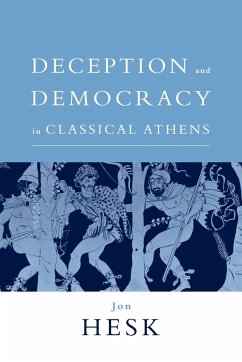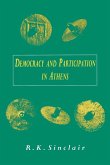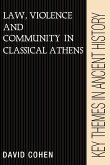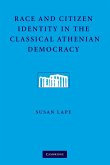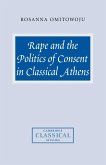A study of the ways classical Athenian texts represent and evaluate the morality of deception.
This is a full-length study of the representation of deceit and lies in classical Athens. Dr Hesk traces the ways in which Athenian drama, democratic oratory and elite prose-writing construct and theorize a relationship between dishonesty and civic identity. He focuses on the ideology of military trickery, notions of the 'noble lie' and the developing associations of rhetorical language with deceptive communication. Deception and Democracy in Classical Athens combines close analysis of Athenian texts with lively critiques of modern theorists and classical scholars. Athenian democratic culture was crucially informed by a nuanced, anxious and dynamic discourse on the problems and opportunities which deception presented for its citizenry. Mobilizing comparisons with twentieth-century democracies, the author argues that Athenian literature made deception a fundamental concern for democratic citizenship. This ancient discourse on lying highlights the dangers of modern resignation and postmodern complacency concerning the politics and morality of deception.
Review quote:
'- thoughtful and wide-ranging.' Perspectives on Politics
Table of contents:
Preface; Prologue; 1. Deception and the rhetoric of Athenian identity; 2. Deceiving the enemy: negotiation and anxiety; 3. Athens and the 'noble lie'; 4. The rhetoric of anti-rhetoric: Athenian oratory; 5. Thinking with the rhetoric of anti-rhetoric; Epilogue; Bibliography; Indexes.
This is a full-length study of the representation of deceit and lies in classical Athens. Dr Hesk traces the ways in which Athenian drama, democratic oratory and elite prose-writing construct and theorize a relationship between dishonesty and civic identity. He focuses on the ideology of military trickery, notions of the 'noble lie' and the developing associations of rhetorical language with deceptive communication. Deception and Democracy in Classical Athens combines close analysis of Athenian texts with lively critiques of modern theorists and classical scholars. Athenian democratic culture was crucially informed by a nuanced, anxious and dynamic discourse on the problems and opportunities which deception presented for its citizenry. Mobilizing comparisons with twentieth-century democracies, the author argues that Athenian literature made deception a fundamental concern for democratic citizenship. This ancient discourse on lying highlights the dangers of modern resignation and postmodern complacency concerning the politics and morality of deception.
Review quote:
'- thoughtful and wide-ranging.' Perspectives on Politics
Table of contents:
Preface; Prologue; 1. Deception and the rhetoric of Athenian identity; 2. Deceiving the enemy: negotiation and anxiety; 3. Athens and the 'noble lie'; 4. The rhetoric of anti-rhetoric: Athenian oratory; 5. Thinking with the rhetoric of anti-rhetoric; Epilogue; Bibliography; Indexes.

